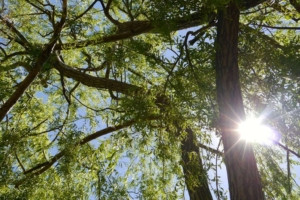In a recent sermon, Pastor Chris Gordon thoughtfully reflected on Psalm 137, a passage that has resonated deeply with me ever since. This Psalm poignantly captures the enduring Christian theme of believers as exiles in this world. Like Abraham, who sought a city built by God (Hebrews 11:10), and countless others throughout Scripture, we are pilgrims. Jesus himself didn’t aim to establish an earthly kingdom. His mission was far greater, focused on a spiritual kingdom, evidenced by his choice not to summon legions of angels against his enemies (Matt 26:53). Instead, he empowered apostles to build embassies of his Kingdom – the church – appointing ministers, elders, and deacons to nurture its citizens through preaching, discipline, and practical care, all while living as “sojourners and exiles” (1 Peter 2:11).
 Exiled People Weeping by River
Exiled People Weeping by River
Psalm 137: A Song of Exile and Lament
Psalm 137 unveils the Psalmist’s lament over his pilgrim status, offering profound insight into the experience of living in the interim—between Christ’s accomplished salvation and its unfolding application by the Holy Spirit within the church, leading to the ultimate consummation. Jerusalem’s fall to the Edomites in 586 B.C. and the subsequent exile to Babylon serve as the backdrop for this powerful psalm. The Israelites’ captivity, a consequence of their unfaithfulness, became a source of mockery by the Babylonians, as reflected in the Psalmist’s sorrowful words.
By the waters of Babylon, there we sat down and wept, when we remembered Zion. On the willows there we hung up our lyres. For there our captors required of us songs, and our tormentors, mirth, saying, “Sing us one of the songs of Zion!” How shall we sing the LORD‘s song in a foreign land? If I forget you, O Jerusalem, let my right hand forget its skill! Let my tongue stick to the roof of my mouth, if I do not remember you, if I do not set Jerusalem above my highest joy! Remember, O LORD, against the Edomites the day of Jerusalem, how they said, “Lay it bare, lay it bare, down to its foundations!” O daughter of Babylon, doomed to be destroyed, blessed shall he be who repays you with what you have done to us! Blessed shall he be who takes your little ones and dashes them against the rock! (ESV)
This psalm stands in stark contrast to many contemporary church songs, often characterized by upbeat, therapeutic themes. Psalm 137 is raw, honest, and deeply sad. It’s a poignant reflection on a past filled with worship in the promised land and the temple, singing divinely inspired songs – the very Psalms being compiled. It’s a lament over Jerusalem’s destruction, a sorrow so intense it’s almost tangible.
This song is acutely present, capturing the humiliation and frustration of the exiled Jews. The taunt, “Sing us one of the songs of Zion!” was laced with mockery, questioning their faith: “Where is your God now? Sing louder!” Yet, amidst despair, the Psalmist pledges unwavering faithfulness to God, invoking judgment upon himself if he forgets Jerusalem and God’s enduring faithfulness.
It also looks forward, though not in a way we might expect. It anticipates judgment, containing what scholars term an “imprecation”—a call for divine retribution against God’s enemies, the Edomites and Babylonians, who scorned God and His people.
The Significance of Singing the Songs of Zion
Zion is a deeply resonant word in Scripture, embodying multiple meanings, primarily referring to both the earthly Mount Zion, where God met his people in the Old Testament, and the heavenly Zion, our ultimate meeting place with God, as described in Hebrews 12:
For you have not come to what may be touched, a blazing fire and darkness and gloom and a tempest and the sound of a trumpet and a voice whose words made the hearers beg that no further messages be spoken to them. For they could not endure the order that was given, “If even a beast touches the mountain, it shall be stoned.” Indeed, so terrifying was the sight that Moses said, “I tremble with fear.” But you have come to Mount Zion and to the city of the living God, the heavenly Jerusalem, and to innumerable angels in festal gathering, and to the assembly of the firstborn who are enrolled in heaven, and to God, the judge of all, and to the spirits of the righteous made perfect, and to Jesus, the mediator of a new covenant, and to the sprinkled blood that speaks a better word than the blood of Abel (Hebrews 12:18–24; ESV).
The author of Hebrews highlights how, in the New Covenant, we “Sing Songs of Zion” in anticipation of the new heavens and the new earth. We haven’t approached Sinai, but Zion. The terror of Sinai pales in comparison to the New Covenant reality. We’ve come to “the city of the living God,” to angels, the heavenly church, and Jesus, the Mediator.
So, how do we sing the Lord’s songs, the songs of Zion, in a foreign land? We do so by acknowledging our status as strangers here. This earth is the Lord’s, yet not our true home. While no earthly utopia is promised, we have a glorious eternal home awaiting us, along with a coming judgment and the ultimate renewal in the new heavens and earth. We sing these songs because we are exiles and pilgrims, singing in hope.
Now is the season not of judgment, but of proclaiming it, alongside the offer of free salvation to all granted new life and faith by the Lord. Judgment is future. We must be cautious in identifying modern-day “Edomites,” but recognize that coming judgment is central to the Gospel, as Paul states: “on that day when, according to my gospel, God judges the secrets of men by Christ Jesus” (Romans 2:16; ESV).
When skeptics scoff, “Where is the promise of his coming?” (2 Peter 3:4), we have an answer. We point to history, reminding them that they are not the first to doubt:
For they deliberately overlook this fact, that the heavens existed long ago, and the earth was formed out of water and through water by the word of God, and that by means of these the world that then existed was deluged with water and perished. But by the same word the heavens and earth that now exist are stored up for fire, being kept until the day of judgment and destruction of the ungodly (2 Peter 3:5–7; ESV).
Just as the flood swept away the scoffers, so too will judgment come at the Son of Man’s return. Until then, like Noah, we call everyone to turn and trust in the Savior. When challenged to sing the songs of Zion, we respond joyfully, bearing witness to salvation and judgment, even as we eagerly await our true Zion.
Authored by:
-
R. Scott Clark
 R. Scott Clark Author ImageR. Scott Clark is President of the Heidelberg Reformation Association, author/editor of numerous books and articles. Since 1997, he has taught church history and theology at Westminster Seminary California, and also at Wheaton College, Reformed Theological Seminary, and Concordia University. He has hosted the Heidelblog since 2007, offering insightful theological reflections and analysis.
R. Scott Clark Author ImageR. Scott Clark is President of the Heidelberg Reformation Association, author/editor of numerous books and articles. Since 1997, he has taught church history and theology at Westminster Seminary California, and also at Wheaton College, Reformed Theological Seminary, and Concordia University. He has hosted the Heidelblog since 2007, offering insightful theological reflections and analysis. -
Twitter

